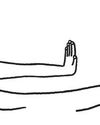
In 1968, the Malian novelist Yambo Ouologuem won France's prestigious Prix Renaudot for a bloody satire about a fictional African country called "Bound to Violence."Opening in mock epic style with the brutality of a medieval empire, and ending amid baroque assassinations in the mid-twentieth century, it vents its spleen in every direction: at slave traffickers, native and foreign; corrupt clerics and mercenary anthropologists; and, especially, oppressive rulers who used idyllic visions of the African past to hoodwink their countrymen. (Among its targets seems to have been Senegal's poet-President, Léopold Sédar Senghor, a leader of the Négritude movement and a future "immortal" of the Académie Française.) The book's biggest dupe is an African student in Paris, cultivated as the "black pearl of French culture" and then installed as the puppet leader of his nation.
Ouologuem's novel was a triumph and a scandal. Western critics hailed the arrival of a Black intellectual unafraid to tell the truth about his continent, whose "startling energy of language," John Updike wrote in this magazine, bespoke "modes of human existence prior to civilization." Many African writers accused him of cynicism or even self-hatred, though later generations would praise him for asserting literature's independence from nativism. In the midst of these debates, it emerged that "Bound to Violence" included unattributed passages from Graham Greene and André SchwarzBart, among others. Ouologuem blamed his publisher for deleting quotation marks, a claim that the publisher found absurd. He left France, disavowed his books, and became a marabout in his native Mali, where he died in 2017.
This story is from the September 18, 2023 edition of The New Yorker.
Start your 7-day Magzter GOLD free trial to access thousands of curated premium stories, and 9,000+ magazines and newspapers.
Already a subscriber ? Sign In
This story is from the September 18, 2023 edition of The New Yorker.
Start your 7-day Magzter GOLD free trial to access thousands of curated premium stories, and 9,000+ magazines and newspapers.
Already a subscriber? Sign In

BADDIE ISSUES
\"Wicked\" and \"Gladiator II.\"

LET'S MAKE A DEAL
\"Death Becomes Her\" and \"Burnout Paradise.\"

ANTI HEROES
\"The Franchise,\" on HBO.

FELLOW-TRAVELLERS
The surprisingly sunny origins of the Frankfurt School.

NOW YOU SEE ME
John Singer Sargent's strange, slippery portraits of an art dealer's family.

PARIS FRIEND - SHUANG XUETAO
Xiaoguo had a terror of thirst, so he kept a glass of water on the table beside his hospital bed. As soon as it was empty, he asked me to refill it. I wanted to warn him that this was unhealthy - guzzling water all night long puts pressure on the kidneys, and pissing that much couldn't be good for his injury. He was tall, though, so I decided his insides could probably cope.

WILD SIDE
Is Lake Tahoe's bear boom getting out of hand?

GETTING A GRIP
Robots learn to use their hands.

WITHHOLDING SEX FROM MY WIFE
In the wake of [the] election, progressive women, who are outraged over Donald Trump's victory at the ballot box, have taken to social media with public, vengeful vows of chastity. - The Free Press.

DEADLINE EXTENSION
Old age, reborn.